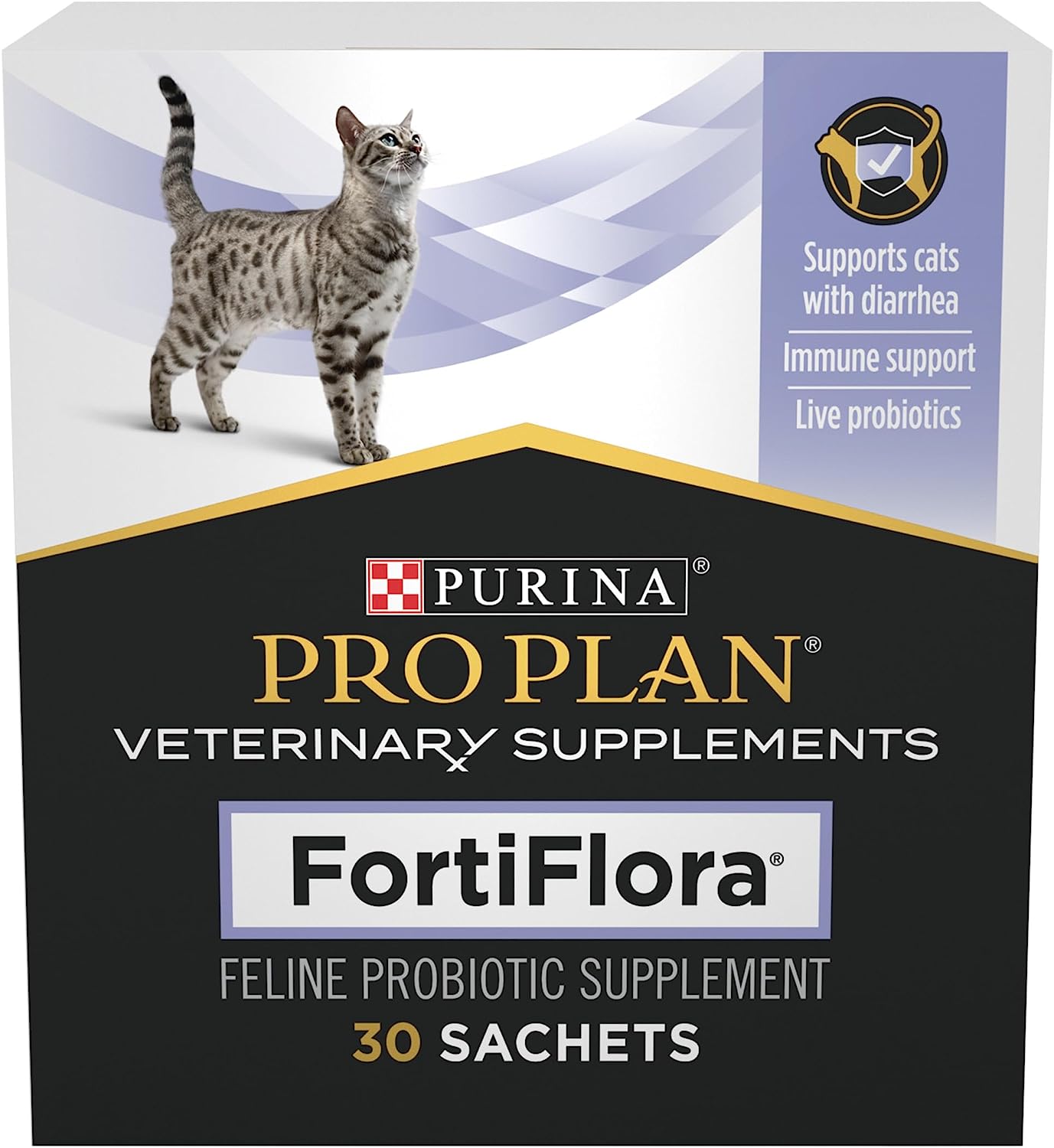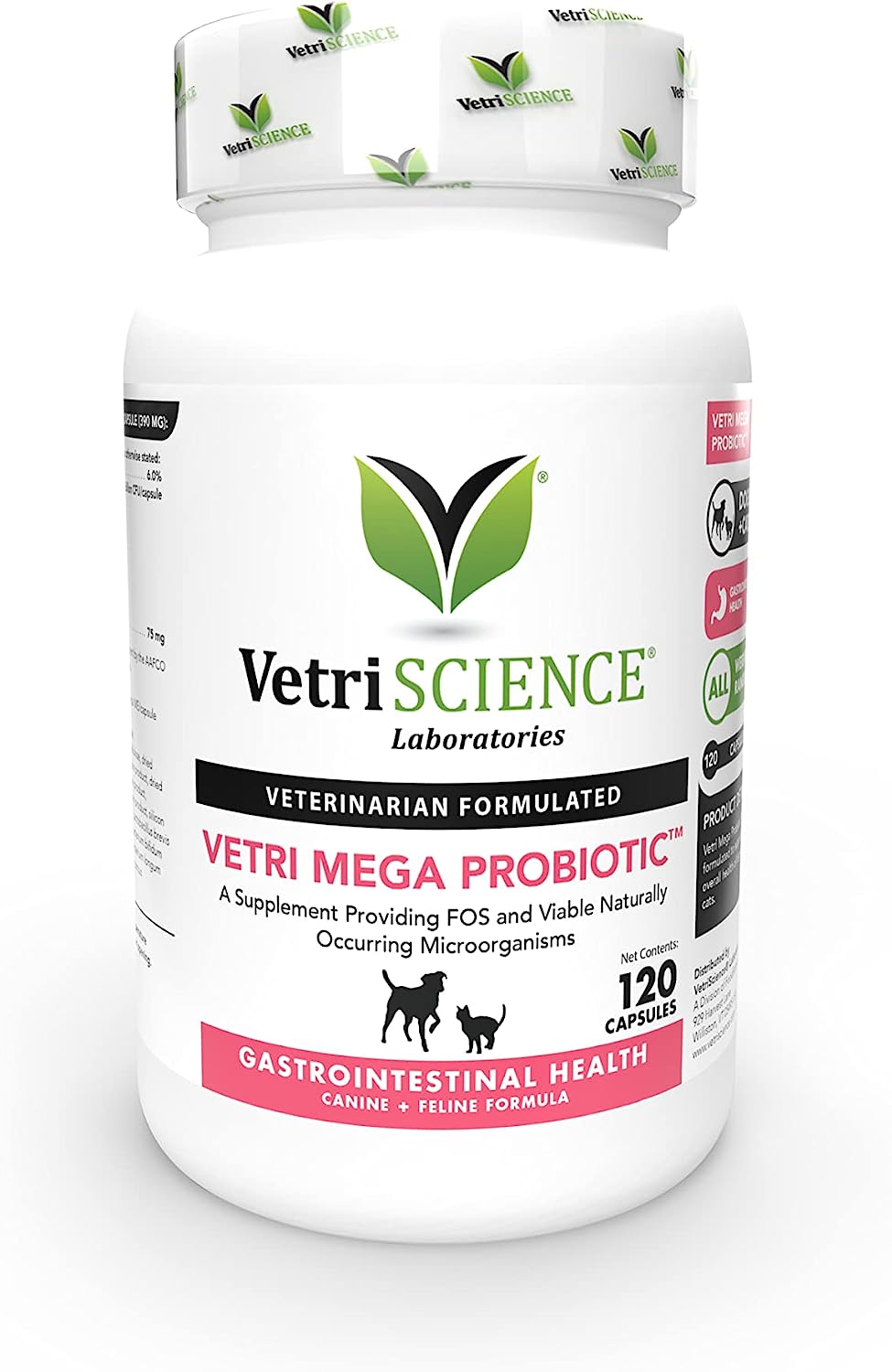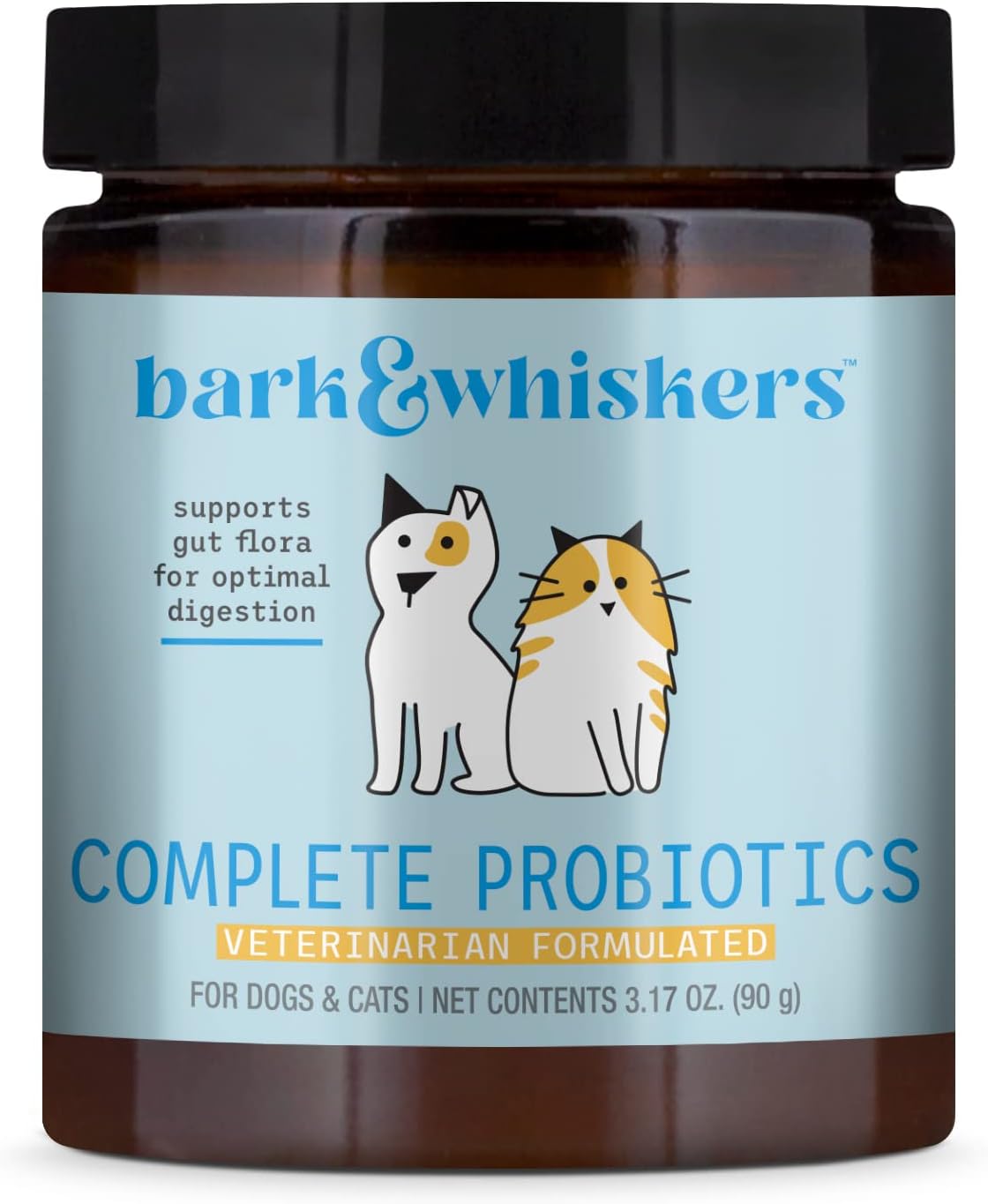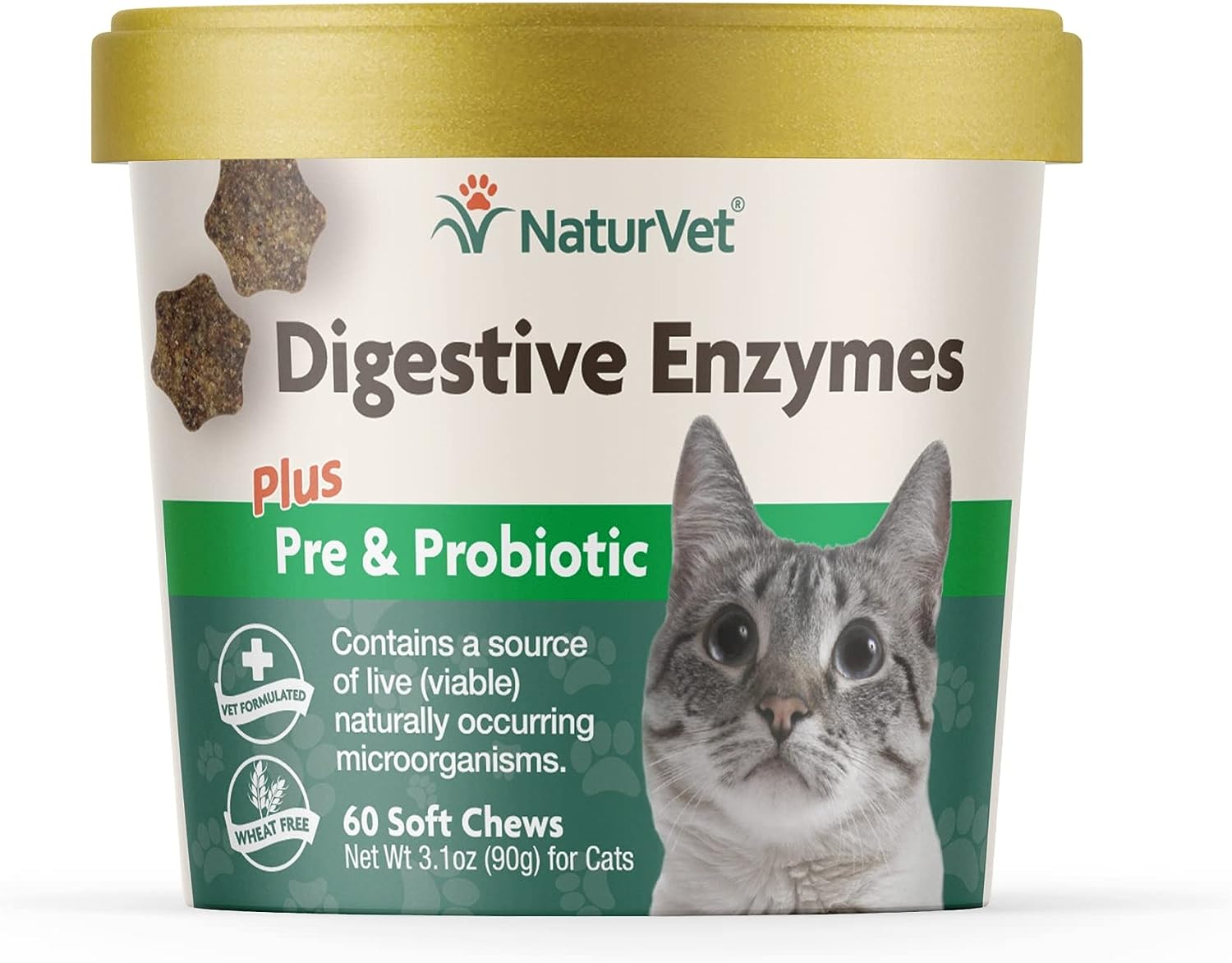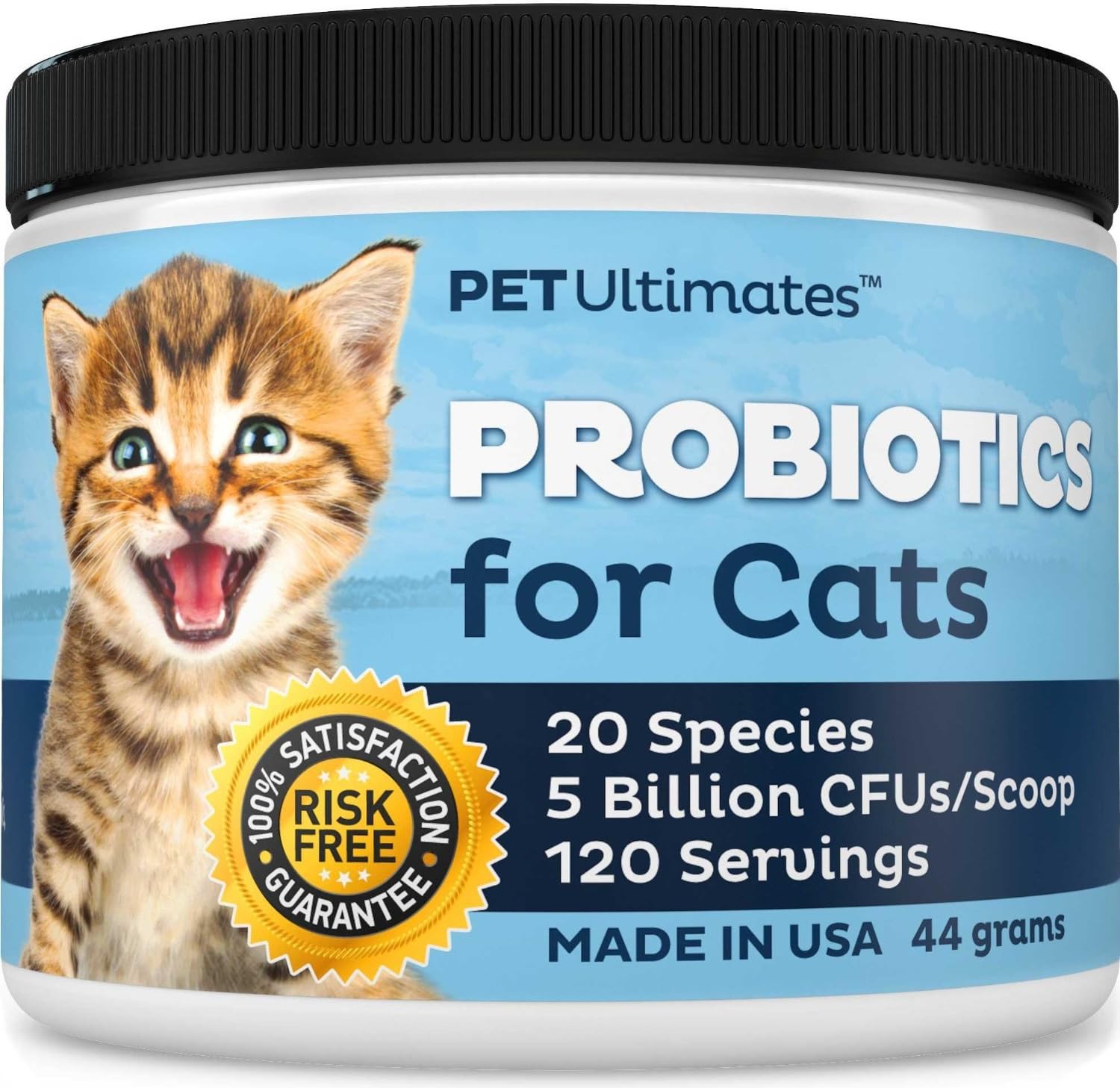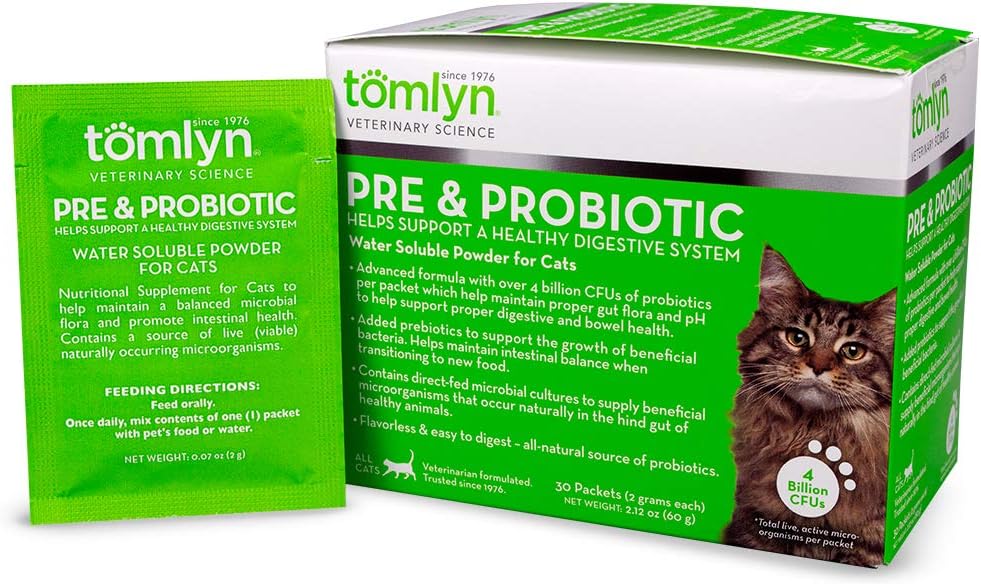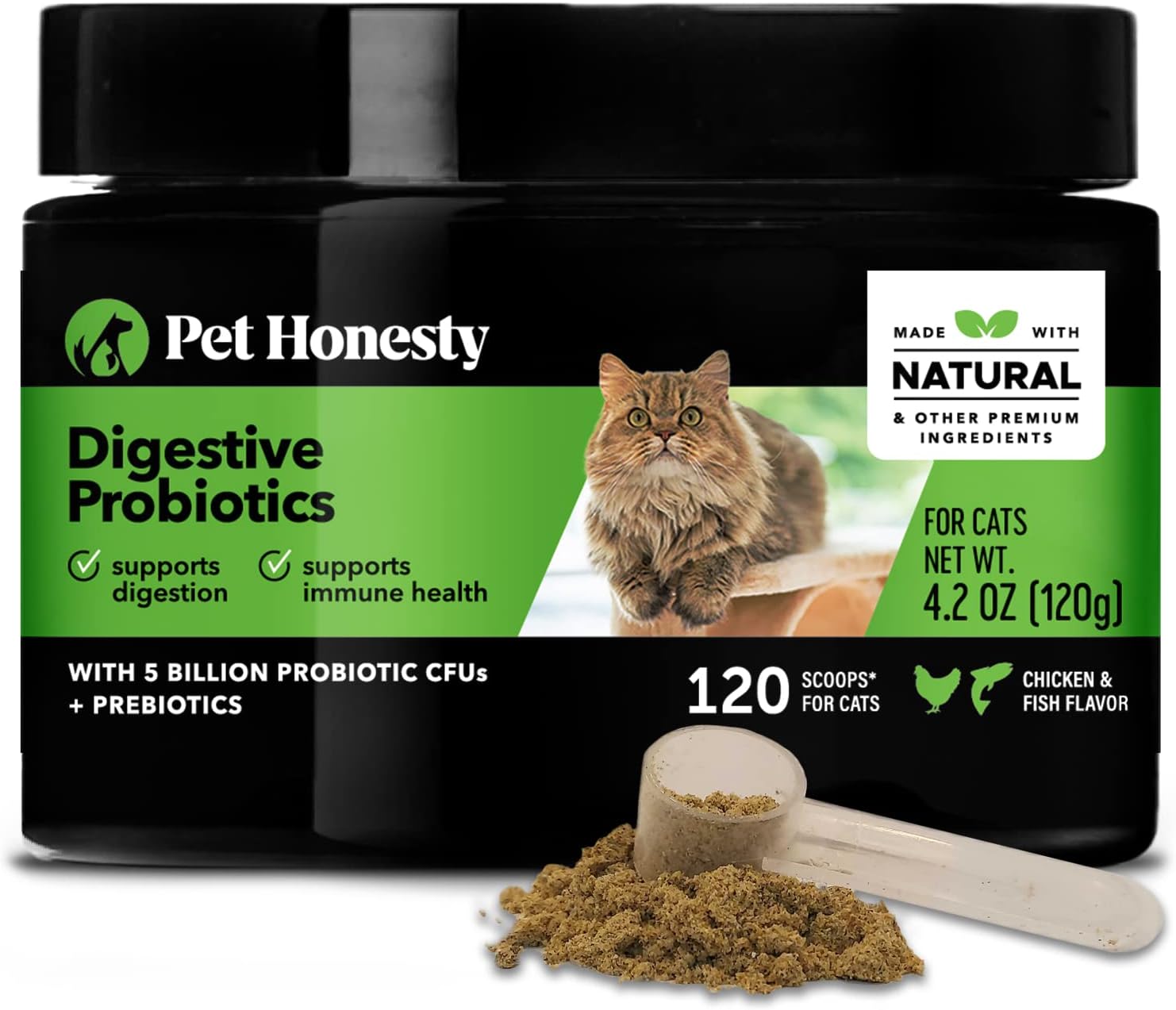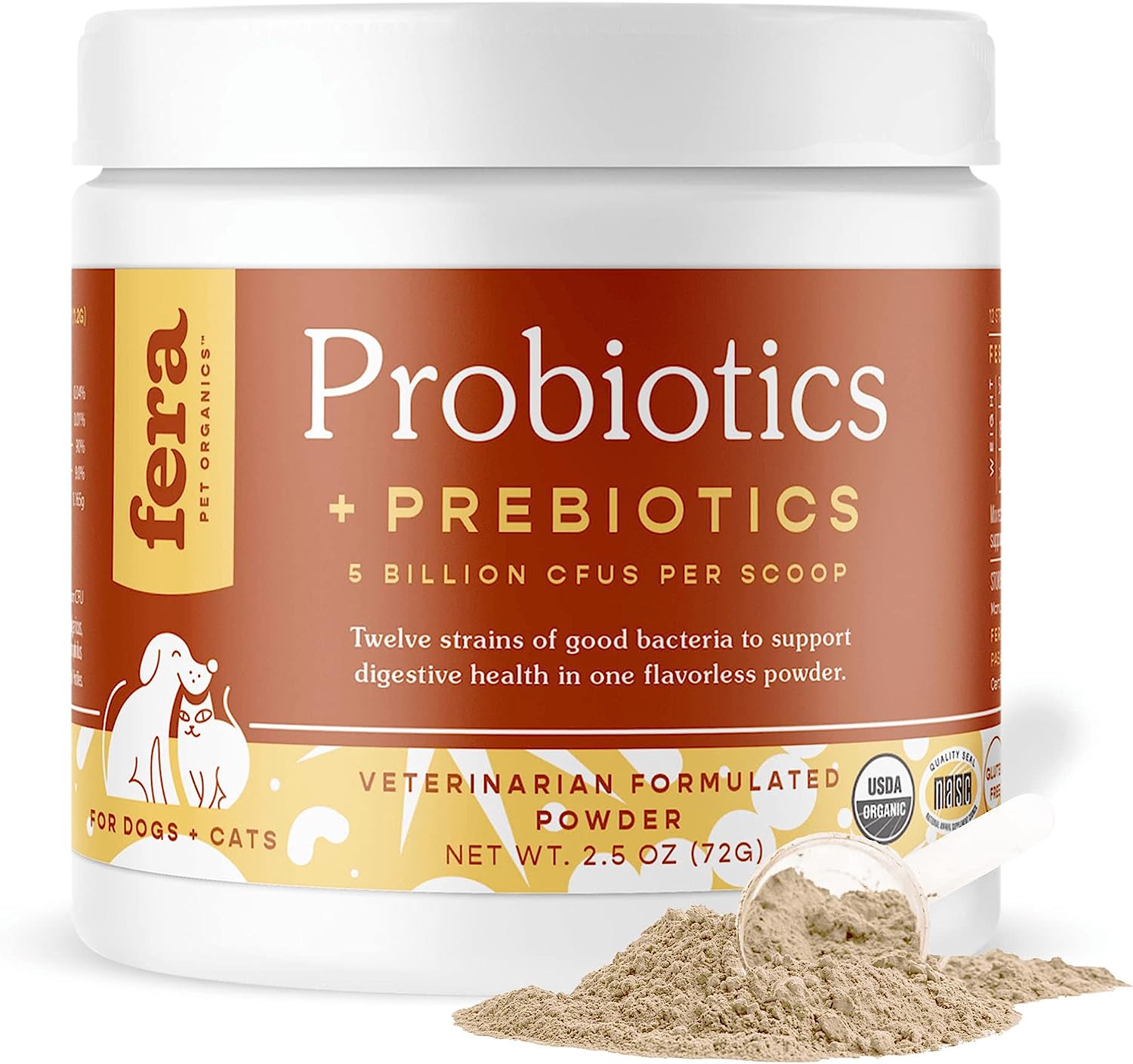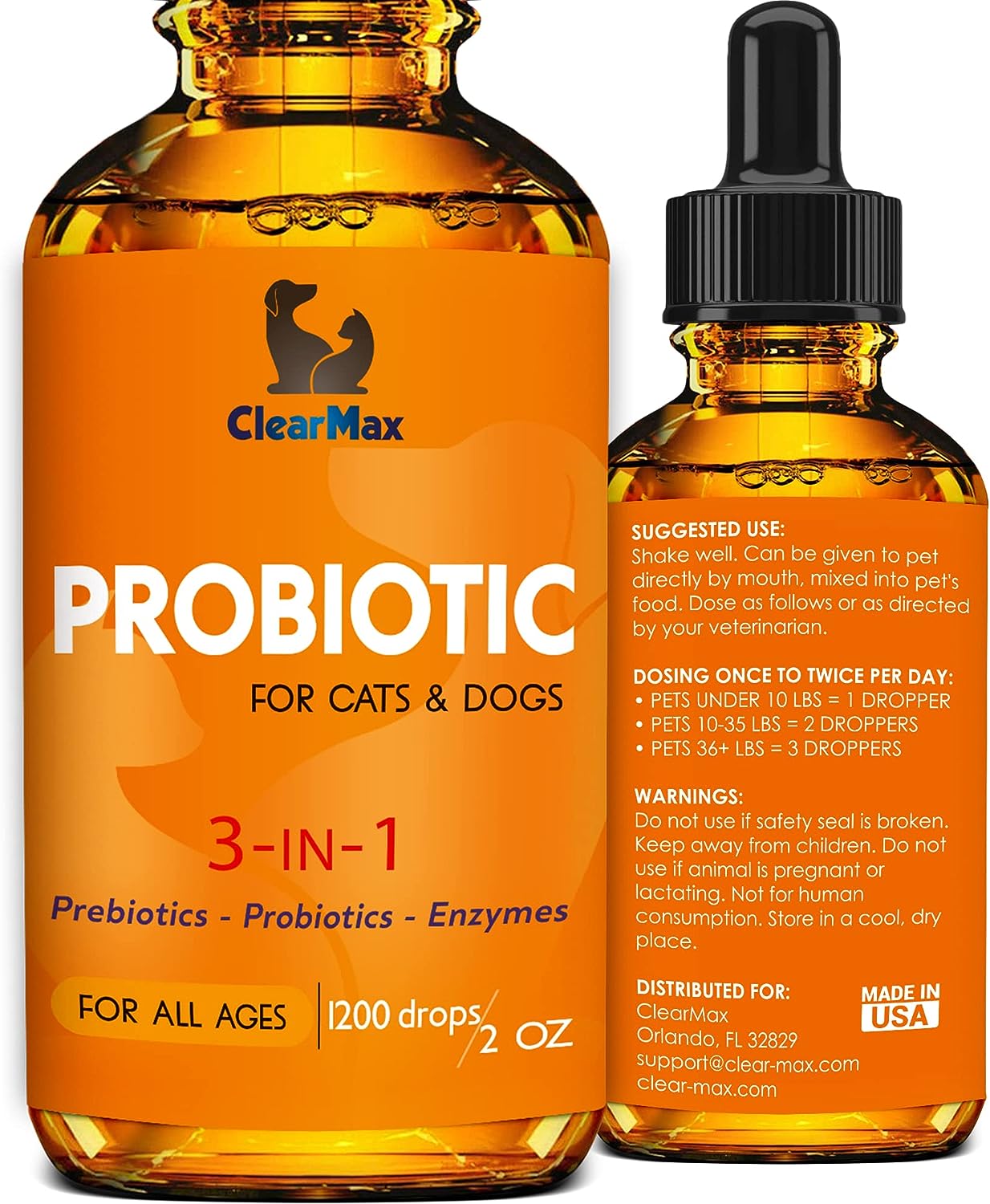iHeartCats is reader-supported. When you buy via links on our site, we may earn an affiliate commission at no extra cost to you.
Probiotics for cats have emerged as a vital topic in feline wellness, reflecting the profound benefits these microorganisms can offer. Just as in humans, a balanced gut flora in cats can lead to improved digestion, bolstered immunity, and enhanced overall health.
These supplements, teeming with friendly bacteria, are designed to restore and maintain this delicate intestinal balance, potentially warding off certain digestive disorders and boosting their immune response. Giving your cat probiotics can be as simple as sprinkling a powder over their food or handing them a yummy treat!
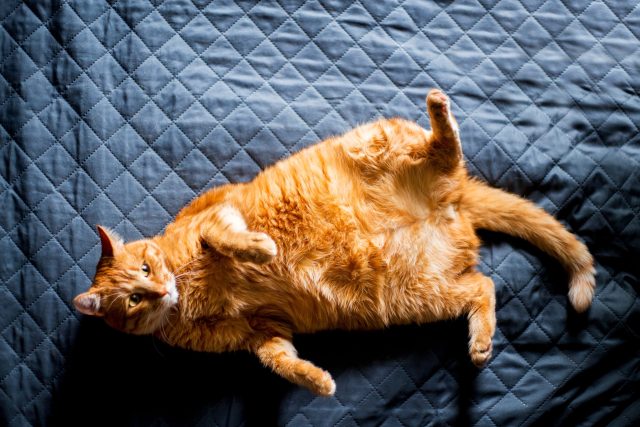
In this article, we’ll navigate through the intricate realm of cat probiotics, listing our choices for the best probiotics for cats and discussing what factors should be considered when making the choice for your kitty. You’ll find answers to your oh-so prevalent queries and concerns. As we journey together, we’ll uncover the science behind these potent supplements and how they can significantly contribute to the vitality of our cherished feline companions.
Buyer’s Guide: Factors to Consider When Choosing Probiotics For Cats
When choosing probiotics for your cat, it’s important to make an informed decision. Several factors should be considered to ensure the product is safe, effective, and appropriate for your kitty’s needs:
Specific Needs of the Cat
Why are you considering a probiotic for cats? Some cats may benefit from specific strains to support gastrointestinal issues, while others might need general gut health support. Identify the specific needs of your cat before choosing a product.
Strains Included
Different strains have different benefits. Look for strains that have been researched and found effective for feline health, such as Lactobacillus acidophilus or Enterococcus faecium.
CFU Count
CFU stands for “Colony Forming Units” and refers to the number of live, active microorganisms in the probiotic. While higher CFUs can seem better, the ideal count can vary depending on the specific need and the strains included. Consult with your vet to understand the optimal amount for your cat.
Certifications and Quality Control
The product should be manufactured under strict quality control standards. Certifications or seals of approval from reputable third-party organizations can help ensure product safety and efficacy.
Additives and Ingredients
Check for additional ingredients. Avoid products with unnecessary fillers, artificial colors, or flavors. Some cats might also be sensitive to certain ingredients.
Form of Cat Probiotic
Probiotics for cats come in various forms like powders, capsules, chews, or added directly to foods. Choose a form that’s easy for you to administer and one that your cat will accept.
Stability and Shelf Life
Probiotics contain live organisms, so check the expiration date and storage instructions. Some might need refrigeration, while others are stable at room temperature.
Price and Brand Reputation
While price shouldn’t be the only determining factor, it’s a practical consideration. Established brands with good reputations are often a safer bet.
Reviews and Recommendations
Consider the experiences of other cat parents. Reviews can provide insights into how effective or well-accepted a product is. But remember, individual results can vary.
Veterinarian’s Recommendation
It’s always a good idea to consult with your veterinarian before introducing any supplement to your cat’s regimen. They can provide advice tailored to your cat’s specific health needs and situation.
Compatibility with Medications
If your cat is on any medication, it’s essential to ensure that the probiotic won’t interfere with it. This is another reason to consult with your veterinarian.
Guarantee or Return Policy
Some companies offer a satisfaction guarantee or return policy, which can be helpful if you’re trying a product for the first time.
Lastly, remember to introduce any new supplement gradually and monitor your cat for any adverse reactions. If you notice any negative side effects, discontinue use and consult your vet.
The 9 Best Probiotics for Cats
#1 – FortiFlora for Cats by Purina Veterinary Diets
FortiFlora by Purina Veterinary Diets stands out as a top-tier probiotic option often endorsed by veterinarians. Its primary strength lies in its specialized formulation containing a proprietary probiotic strain known to enhance intestinal health and achieve balance. Tailored specifically for cats, FortiFlora is both easy to administer and generally well-accepted by feline friends. It also plays a vital role in managing diarrhea related to dietary transitions or antibiotic therapy. The consistency in its quality and the trust associated with the Purina brand makes it a reliable choice. However, some users may feel it’s priced slightly on the higher side.
Pros:
- Highly effective for managing dietary transition diarrhea
- Easy to administer
- Reliable brand reputation
Cons:
- Can be relatively expensive
#2 – VETRISCIENCE Laboratories Vetri Mega Probiotic and Prebiotic for Dogs and Cats
Vetri Mega Probiotic and Prebiotic by VETRISCIENCE Laboratories is a masterclass in holistic pet care, expertly crafted for both dogs and cats. With its dual functionality, this product not only introduces beneficial bacteria into the gut but also provides the nourishment these bacteria need to flourish, ensuring a well-rounded approach to digestive health. Suitable for both felines and canines, this versatile supplement exemplifies adaptability, making it a staple for multi-pet households. To make serving felines easier, you can open the capsule and pour contents over food.
Pros:
- Versatile for multi-pet households
- Offers a rounded approach to gut health
- Backed by a trusted brand
Cons:
- May not be as effective for some cats due to broad formulation
#3 – Dr. Mercola Bark & Whiskers Complete Probiotics
Dr. Mercola Complete Probiotics for pets has been formulated with care to mirror the benefits humans gain from probiotics. Its robust blend aims to establish a balanced gut flora, crucial for overall health. This probiotic powder provides dogs and cats with 38 billion CFU beneficial bacteria from 14 carefully selected strains known to promote optimal gastrointestinal health in pets. Dr. Mercola, a trusted name in the wellness sector, ensures that the product lives up to high standards of quality. With the included scooper, the powder can be sprinkled over food, ensuring easy serving.
Pros:
- Trusted brand reputation
- Suitable for feline digestive systems
- Ideal for homes with cats and dogs
- Easy to administer
Cons:
Premium pricing
#4 – NaturVet – Digestive Enzymes Plus Probiotic
NaturVet’s Digestive Enzymes Plus Probiotic offers a unique blend that goes beyond mere probiotics. By introducing digestive enzymes alongside beneficial bacteria, it caters to a comprehensive digestive health strategy. The product is suitable for cats dealing with digestive upsets or needing extra support during dietary transitions. It’s a holistic approach to feline wellness, ensuring nutrients are appropriately absorbed. The dual action is its main draw, but some cats might need an adjustment period to get used to its taste.
Pros:
- Comprehensive digestive health
- Dual-action formulation
- Promotes nutrient absorption
- Suitable for various digestive needs
Cons:
- Some cats may need time to adjust to its flavor
#5 – PetUltimates Probiotics for Cats
PetUltimates Probiotics for Cats stands out with its impressive 20 species of beneficial bacteria. This broad spectrum approach ensures all-encompassing gut health support. It also has the added benefit of potentially reducing litter box odor, a feature many cat parents will appreciate. The powder form allows for easy mixing with food, ensuring hassle-free administration. Its diverse strain blend is certainly a highlight, though it’s essential to introduce it gradually.
Pros:
- Broad spectrum probiotic blend
- Easy to mix with food
- Potential to reduce unwanted odors
- Made from 100% USA-sourced ingredients
Cons:
- Need to introduce gradually to some cats
- On the expensive side
#6 – Tomlyn Pre & Probiotic for Cats
Tomlyn’s Pre & Probiotic for Cats is a versatile product that acknowledges the synergy between prebiotics and probiotics. The water-soluble powder ensures that the product can be seamlessly mixed with a cat’s water or food. Designed to support overall digestive health, it also aids in fostering a balanced gut environment. Tomlyn, a respected name in pet care, ensures product reliability. While the water-soluble feature is a plus for many, it’s essential to ensure that cats take their complete dose, as they might not always finish their water.
Pros:
- Versatile administration options
- Fosters a balanced gut environment
- Reliable brand
Cons:
- Cats might not always consume their full dose if mixed with water.
#7 – Pet Honesty Digestive Probiotics Max Strength for Cats Supplement
Pet Honesty’s Digestive Probiotics Max Strength is a testament to the brand’s commitment to feline wellbeing. This maximum-strength formula has been tailored specifically for cats, with the aim to provide robust support for their digestive systems. The higher concentration ensures that cats receive ample beneficial bacteria to maintain a balanced gut. Many users have reported a noticeable improvement in their cats’ digestive health, from reduced stomach issues to better nutrient absorption. While its potency is one of its major strengths, it’s vital for cat parents to follow dosage recommendations and monitor their cats for any signs of intolerance.
Pros:
- High concentration for effective results
- Noticeable improvements in digestive issues
- Made with natural ingredients
- No chemical fillers or harsh preservatives
- Reliable brand
Cons:
- Some cats might require a gradual introduction due to its potency
#8 – Fera Pet Organics – Probiotics for Dogs and Cats
Fera Pet Organics’ Probiotics is a reflection of the brand’s holistic approach to pet care, catering to both dogs and cats. The versatile formulation ensures that households with multiple pets can turn to a single, reliable product for their probiotic needs. Being crafted from organic ingredients further adds to its appeal, offering peace of mind to pet owners concerned about additives or chemicals. The product works diligently to promote gut balance and overall health for both felines and canines. However, given its broad spectrum appeal, it’s crucial for pet owners to observe individual reactions in their pets.
Pros:
- Versatile for households with multiple pets
- Made from organic ingredients
- Promotes gut balance for cats and dogs
Cons:
- Priced higher than other options
#9 – Clear Max Probiotics for Dogs and Cats
Clear Max Probiotics for Dogs and Cats stands out with its commitment to delivering premium gut health solutions for pets. Specifically formulated for both dogs and cats, it offers a harmonious blend of prebiotics and probiotics designed to maintain optimal digestive health. The product prides itself on its meticulous crafting, ensuring the longevity and potency of the beneficial bacteria within. This versatile liquid probiotic supplement is a treasure for multi-pet households, streamlining the task of administering probiotics for cats and dogs.
Pros:
- Ideal for households with varied pet types
- Maintains a high standard of active bacterial strains
- Simplifies the supplementation process
Cons:
- Expensive option
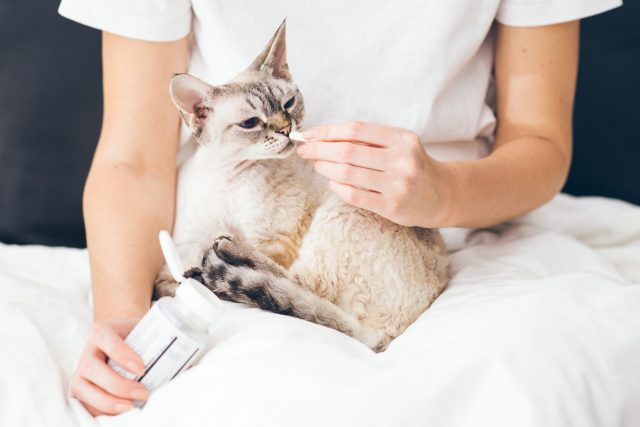
FAQs About Probiotics For Cats
Are probiotics good for cats?
Probiotics are beneficial microorganisms that can support feline gut health, improve digestion, and bolster the immune system. When administered appropriately, they can enhance the overall well-being of cats, especially during times of stress or after disruptions to their gut flora, such as antibiotic treatment.
Do cats need probiotics?
While cats don’t inherently need probiotics to survive, these supplements can be advantageous in specific scenarios. For instance, if a cat has undergone antibiotic treatment, has gastrointestinal disturbances, or needs immune support, probiotics can be beneficial in restoring and maintaining a healthy gut balance.
Can I give my cat probiotics every day?
Yes, many cat probiotics are designed for daily administration. However, the frequency and dosage should be based on the product’s instructions and your veterinarian’s advice. Regular intake can help maintain gut health and provide consistent benefits.
Can cats have human probiotics?
While some strains in human probiotics might be safe for cats, stick with products specifically formulated for felines. This ensures that the strains and dosages are appropriate for a cat’s digestive system and needs.
Are probiotics good for cats with diarrhea?
Probiotics can be beneficial for cats experiencing diarrhea by helping to restore the balance of beneficial bacteria in the gut. They can aid in alleviating symptoms and promoting gut health. However, the underlying cause of the diarrhea should be identified and addressed, often necessitating a vet’s consultation.
Can probiotics cause diarrhea in cats?
While probiotics are typically safe and well-tolerated, introducing them suddenly or in large amounts might lead to digestive upset, including diarrhea, in some cats. It’s always recommended to introduce any new supplement gradually and monitor for any adverse reactions.
Are there any side effects with cat probiotics?
Most cats tolerate probiotics well, but potential side effects can include mild digestive disturbances like gas, bloating, or diarrhea. These side effects are generally temporary and subside as the cat’s system adjusts. If persistent or severe side effects occur, it’s crucial to discontinue the probiotic and consult a veterinarian.
Can probiotics help with allergies in cats?
Some evidence suggests that probiotics might modulate the immune system, potentially benefitting cats with allergies. By promoting a balanced gut flora, probiotics may aid in reducing inflammatory responses associated with allergies. However, while promising, more research is needed, and individual cases may vary.
Can kittens take probiotics?
Yes, kittens can benefit from probiotics, especially during transitions like weaning, changes in diet, or stressful situations. It’s important to choose a product formulated for kittens or adjust the dosage according to the kitten’s size and weight, always under veterinary guidance.
What’s the difference between prebiotics and probiotics?
Probiotics are live beneficial bacteria that promote gut health when consumed, while prebiotics are non-digestible fibers that act as food for these beneficial bacteria. Prebiotics help foster the growth and activity of good bacteria in the gut, enhancing the effectiveness of probiotics. Essentially, probiotics introduce beneficial bacteria, while prebiotics nourish and support them.
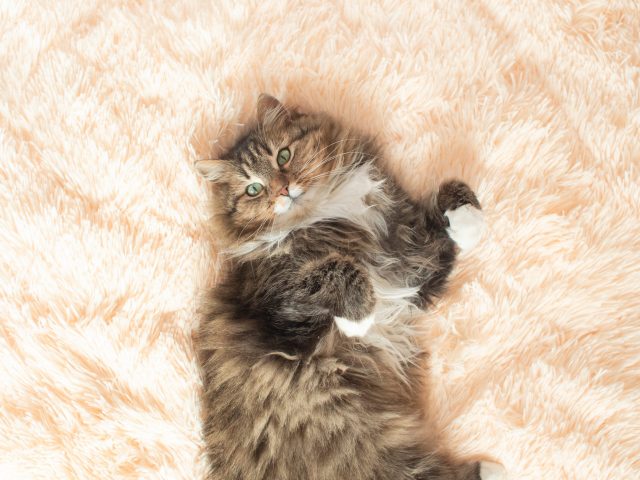
Final Words
In summary, the best probiotics for cats offer a promising avenue to enhance feline health by nurturing a balanced gut ecosystem. With their potential to improve digestion, strengthen immunity, and address various gut-related concerns, they’re becoming an integral part of holistic pet care. As with any supplement, always consult with a veterinarian to ensure the best choices for your furry friend’s unique needs.

